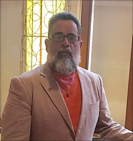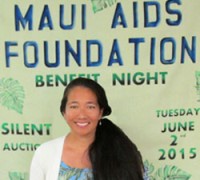By NMAC Conferences Coordinator Aryah Lester
 I live in the basement: the lowest floor of the social systems we have here in America. Above me live the middle-class: not concerned with the trials of the lower class; the privileged: living in a bubble of supremacy; and the blessed: ignorant of truly fighting for acceptance into humanity. Proud and jubilant footsteps drum upon my ceiling from the house parties of the heterosexual, the men, those not of color, and even the LGB crowd. You see, I am a transgender woman of color, and my lot in life has been to continue striving towards access above the basement of this country: to fight not only for myself, but for my sisters trapped with me.
I live in the basement: the lowest floor of the social systems we have here in America. Above me live the middle-class: not concerned with the trials of the lower class; the privileged: living in a bubble of supremacy; and the blessed: ignorant of truly fighting for acceptance into humanity. Proud and jubilant footsteps drum upon my ceiling from the house parties of the heterosexual, the men, those not of color, and even the LGB crowd. You see, I am a transgender woman of color, and my lot in life has been to continue striving towards access above the basement of this country: to fight not only for myself, but for my sisters trapped with me.
In my 36 years of life, I had first learnt about the perceived differences in skin color, notwithstanding our commonality or upbringing. A youth attending middle school in the rural south, I experienced statements like: ‘Nigger, get off my property’ (italicized with a shotgun). I empathized with my father when he was refused well-deserved promotions because he was of color, and my mother (of many talents) who took care of her household with jobs such as housekeeper and home health aide.
Our school cafeterias had an invisible yet distinct line, across which you saw white faces on one side, and all those darker on the other. I first realized there was a floor above me. As someone who was always feminine, I quickly then learned the demeaning micro- (and outright violent) aggressions against women or femininity in our male-dominated society. I had begun to hate the parts of me which exuded the power of women: my butt, my lips, my voice, and my lack of body hair. Women all around me were delegated to the floor below in their homes, at their jobs, and in the public. Women in our history books were often just sidekicks of ‘greater’ heroes, who all happened to be male. Even the Christianity I was taught regarded the creation of the female body as a ‘complement to’ the man.
When I started transitioning in the year of 1998 and entered my life as a transgender person, the basement door became sealed. I found myself pounding on the door for employment, searching for the keys to a healthy relationship, and trying to break the windows of public opposition. Time and time again I was teased, or straight out denied access to the life we all deserve: simple, quiet. It was at that time I started to be educated in HIV/AIDS, from an organization I volunteered at: the New York Peer AIDS Coalition. I discovered the increased risk I faced in just being me, a transgender woman of color. I started educating my peers in easy ways, through distribution of condoms and lube to my fellow party-goers and streetwalkers. My path had begun. I remained, however, in the basement.
I literally resided three floors below the tragic site of my infection. Even now I can picture and smell the scene, which encapsulated my lifelong residence of the American basement. I was staying (unofficially) with a close friend in the south of Miami-Dade county, after losing my apartment and finding myself chronically unemployed. Getting up one day in November of 2013 from the couch I slept upon, I went downstairs to the store. Returning to the building, I entered with a handsome young man who sparked a conversation with me, and then invited me upstairs to continue to talk. I saw no harm in the invitation, especially with the security of the development vetting his presence. I followed him to the upper floors.
Once entering the door, I immediately knew the situation was not what I could have imagined. The apartment was one which was empty and abandoned, and smelt of secret parties, urine, and excrement. With his body pressing me against the wall and my body on the floor in quick succession, I could only think of my stay in the basement. ‘I could scream.’ ‘My friend might be blamed.’ ‘I might be kicked out, not being on the lease.’ ‘Who’s going to believe me?’ ‘Just take it, you’ve been raped plenty of times before.’ When he finished and was in the lethargic state of ‘after-sex’, I rose my bloodied and hurt body and quickly headed out, with not a word to anyone about the situation which occurred.
A couple of months went by and I found myself in the hospital from common yet severe symptoms without a source. A few weeks later, I found myself training counselors for HIV testing due to my years experience working in the field. Using myself as a test subject, I noticed the shockingly reactive test result. I grabbed my friend and we tested myself again, proceeding to complete an anonymous confirmatory test for the laboratory. I already knew my recent encounter infected me; I knew my mind trapped in the basement allowed it to happen with no consequence.
It did not matter to my advocacy because people already assumed I was HIV-positive because of my dedicated work in preventing HIV/AIDS in our communities for years. It did matter to my psyche, it mattered to my pride, and it mattered to my future. Most importantly, it mattered to my resolve: to help my sisters get their minds out of the figurative basement, and to see their worth. The worth of their bodies. The worth of their femininity. The worth of their color. Their worth. My worth.
 My experience with the 2018 USCA: First impression was the immediate connection I felt with recipients of the 50+ scholarships. The staff was amazing, they made themselves available to us, they guided us through the workshops, and they answered all of our questions. They went above and beyond my expectations.
My experience with the 2018 USCA: First impression was the immediate connection I felt with recipients of the 50+ scholarships. The staff was amazing, they made themselves available to us, they guided us through the workshops, and they answered all of our questions. They went above and beyond my expectations.



